Ride On (2023)
Directed by: Larry Yang
Written by: Larry Yang
Starring: Andy On, Haocun Liu, Jackie Chan, Kevin Guo
AKA LONG MA JING SHEN
CHINA
AVAILABLE ON BLU-RAY, DVD and DIGITAL: 24TH JULY, from CINEASIA
RUNNING TIME: 126 mins
REVIEWED BY: Dr Lenera
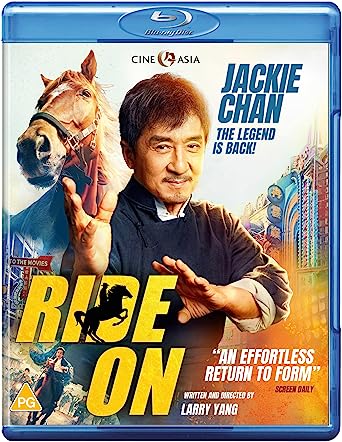
Lao Lau is a famous and respected stunt man. He lives with his horse Red Hare and two apprentices Yuanijie and Yingzi, but things aren’t going too well for him right now. Job offers are drying up for the aging daredevil, and there’s not much else he can do. He has a daughter, Xiao Bao, whom he lost custody of when he divorced his wife several years ago, and who doesn’t wish to see him. However, when two representatives of the DY Capital corporation try to claim Red Hare as part of their boss’ property, following a messy lawsuit involving Red Hare’s previous owner, Lao thinks Xiao may be able to help him. Fortunately her boyfriend Naihau is a lawyer, and Lao begins to wonder if Red Hare could be the key to him getting steady work again….
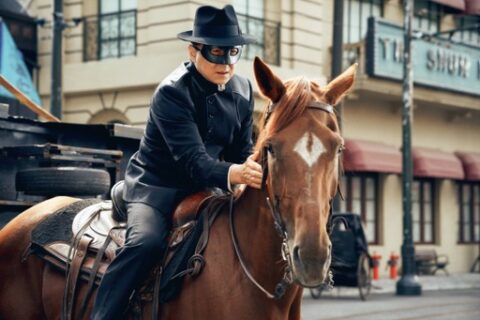
I don’t think that it’s in any way an insult to the man when I say that the days when us Jackie Chan fans awaited his next movie with baited breath are long gone. He was always a busy bee, a true workaholic who didn’t seem to ever want to take a lengthy break, but for a long time that was fine because the Hong Kong film industry was on fire and seemed incapable of producing something that was dull, so whatever Chan was in was always worthwhile. Fast forward to now and the Hong Kong film industry barely exists and Chan makes most of his films for a propaganda-loving China, every now and again also doing one for the United States. The quality of the films is very variable, as if Chan doesn’t like to turn down a script, while never achieving the heights he often reached in the old days; only The Foreigner really stands out. Meanwhile his once-spoken ambition of being “the Asian Robert De Niro” hasn’t been given a decent chance to materialise because Chan still likes to play characters who are adept at the martial arts but, due to his age, just can’t do what he used to do anywhere near as much. Apparently Chan initially turned down writer / director Larry Young’s screenplay for Ride On and asked him to revise it, which he did in five days, after which Chan accepted. I can’t imagine that the original script was that different from what was filmed, so I can only surmise that Chan felt uncomfortable about playing a lead character who shares a lot in common with himself. Ride On is not an autobiographical piece, it’s not even semi-autobiographical, despite scenes where Chan’s real-life stunts play on reels and a lot of references to past glories, but some commentary on the man and his career can still be discerned and were clearly intended even if it’s really a tribute to that often unsung heroes of filmmaking the stunt people – well, that, an emotional drama on the relationship between a man and a horse, and an emotional drama on the relationship between a man and his daughter. Unashamedly sentimental, the cynical viewer may react against the heavy manipulation, but the film’s heart is definitely in the right place and it has what may be Chan’s greatest performance.
The usual multitude of Chinese production companies opens the film before we zoom in on Lao’s place. Our man is sleeping but is woken up by his horse Red Hare. His price for objecting is to be lifted up by Red Hare’s mouth and dunked in water. Lao is next seen at a film set, sitting down, looking up at a building which reminds us of a certain clocktower – yes, we get a one second flash of that moment from Project A. As I type, I’m struggling to decide if such moments were too on the nose or not, and could have done with being more subtle. Anyway, two men say that Lao “was probably the best stuntman in the business” and still likes to hang around sets even if he’s not getting much work now. Sitting having a drink, he’s accosted by four debt collectors, the leader a guy named Dami Ge, who wants Red Hare as collateral. Of course Lao isn’t going to have that, leading to a major action set piece that may seem to be deceptive to some viewers, suggesting that the film will be a full-on thrill ride, though I should warn you know that it’s not, even though there are three such scenes that require Chan to attempt to do his thing again. Back at his home, Lao is visited first by two more men who tell him that the company which originally owned Red Hare is now bankrupt and they have the legal rights to auction Red Hare off; this time Lao’s fellow residents Yuanijie and Yingzi come to help. Lao is unversed in such matters, so visits his daughter Xiao Bao for aid. However, she tells him that she wants nothing to do with him. Why? Flashbacks fill us in, presenting us with the well-worn premise of a once-neglectful father who keeps making mistakes but who does very much love his daughter really. He divorced his ex-wife when Bao was only one years old, didn’t visit Bao often, and a few years later the wife died on a hospital bed right in front of her daughter.
Sound slushy and soapy? Yes indeed, and a lot of time is spent on this stuff, but you may very well feel a bit emotional when the young Bao doesn’t recognise her father, and when the dying mother tells her daughter to go see her dad, or when she does first visit Lao and is hesitant before seeing Lao dressed as a Native American trying to make money by asking kids if they want to be photographed with him. Those with a weakness for animal-centred movies of the soppy kind may very well also affected by the flashback to when Lao met Red Hare, the horse being sick and dying but able to get up and go to Lao before whom he kneels. I wouldn’t be surprised if some other critics have expressed dislike for all this, and the film does lay it on with a shovel, but, because such an old-fashioned approach isn’t done much these days, I found it quite refreshing, replete with a music score by a person who calls himself “Loudboy”, which rarely shuts up and even underscores some light moments [the latter being something which is generally not something I’m a fan of], but which goes full-on in the emotional scenes, with heavy use of strings. Bao’s boyfriend Naihua agrees to help Lao even though Lao seems more interested as to whether Naihau can fight and in teaching him some skills, but the plot only really gathers a bit more pace when, after Lao’s fight with the debt collectors goes viral, he hired for a film by one of his old directors, and he’s been training Red Hare to do stunt work, so it’s man and horse working together now. After some hesitation, the pair pull off an amazing action set piece and become in regular employment, with Bao becoming Lao’s agent, always fighting his corner, such as arguing for better conditions. However, Lao seems to be pushing both himself and his horse further and further, to the worry and frustration of Bao. However, there’s not much else an aging stuntman can do, is there, and, as we’re told twice, “jumping down is easy, but stepping down is hard”.
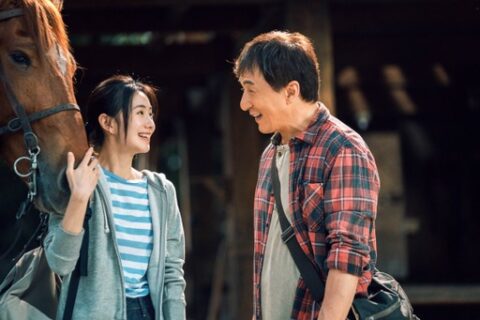
Lao’s action on set, which usually requires Chan to don period garb again, and even at one point act on a very Shaw Brothers-looking set, results in several huge jumps which are obviously hugely CG-enhanced and edited together but look reasonably convincing, plus a large set piece where he’s required to fight off a crowd of suited, mostly axe-wielding thugs resembling the ones in Kung Fu Hustle, in and outside of a bus from which man and horse jump off onto the road. It’s odd seeing Chan do some highly gravity-defying stuff of the kind that he rarely does. Chan’s three run-ins with the debt collectors are when Chan is able to to still show off his stuff, even if the second fight is a shorter reprise of the first in the same location. Obviously major athletic moves such as flips are now edited together from different shots, and Chan’s opponents have to appear to be slower than a guy well over twice their age which usually results in some awkward choreography [no disrespect to Chan intended here, I’m sure that he’d still be able to beat the hell out of me in three seconds], though it’s pretty good here. These scenes do come off better than some comparable ones that we’ve recently seen from Chan, with his famed use of the environment well in evidence as rocking chairs, tables, food etc. are well employed. He even goes onto some rafters at one point during the third fight, and gallops on his horse through a hotel in the first which might be the film’s most exciting moment, even if the actual chase, which also involves motorbikes, doesn’t develop as strongly as you may expect it to do. Overall the action is about as good as we should have a right to expect from a film starring a 69-year old, while the recalling of older films isn’t that prominent in it; one can notice little things from the likes of Miracles: The Canton Godfather and even Rush Hour, but then Chan often rehashed earlier gags. Certain references elsewhere do suggest a meta element that the script, perhaps thankfully, generally keeps its distance from.
The old-style stunt-people who risked life and limb to entertain us are clearly being celebrated here; when Lao is invited to be in a film which does things the safe way and expresses a low regard of CGI [he doesn’t want to be a “cartoon”] it’s a viewpoint which Yang and Chan clearly also have. However, we’re clearly being asked to wonder if Lao still doing what he’s doing at his age is wise, and we certainly don’t like him when he’s pushing his poor horse further and further. After all, the horse is probably the secondary main character, and the final act, which seems to end before it actually does, revolves principally around Lao and Red Hare. It looks like a real horse [or possibly horses, I couldn’t tell] was used throughout, which is refreshing, and Red Hare may win your heart even if you don’t like horses [I’m not a fan myself]. He’s a pretty good actor, after all, though then again so is Chan in this movie, really impressive and not afraid to act and look his age for most of the time. The hamminess that Chan often resorts to when trying to prove himself as an actor doesn’t really materialise and when he cries and cries we feel that it’s certainly earned. In a film which takes its time, with a lot of long scenes, there are still signs that some good material is missing. Some characters still seem underused, most notably Yuanijie and Yingzi, the next generation. Naihau gets an odd but touching introductory moment where he’s watching a man and a child tearfully and remorsefully says “I said the father was worthless but I split them up”, but the potentially interesting passageways suggested by this aren’t explored and the court room material doesn’t really have the tension that good sequences of this kind ought to have.
The cynic in me can’t help but wonder if Chan partly made this film to restore an image which has been tarnished in recent years by his support for China’s totalitarianist government and seemingly poor treatment of his two children. Whether this is true or not, Ride On is Chan’s best film in quite a while. The term “thought provoking” is not one that one can and should usually apply to a Chan film [except for sometimes wondering about his sanity after seeing a death-defying stunt or two], but the undeniably rather odd mix of sentimentality and self-reflexivity is pulled off very well so that we both care and think. Even though our digital age has sadly removed some of the need for their services, those stunt-people really do deserve more credit and respect.
Rating: 











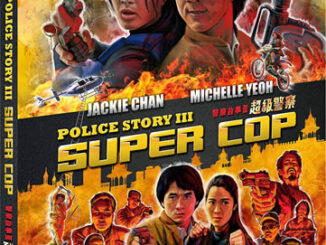
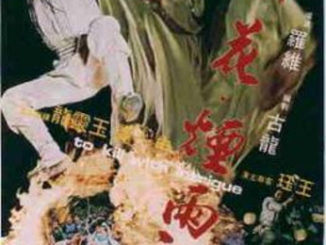

Be the first to comment